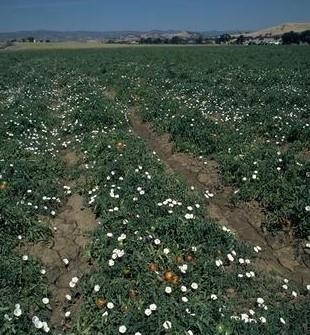By Alison Collin
Although I'm familiar with bindweed from past experience, for some reason it had never put in an appearance in my West Bishop garden until three years ago. A year after removing a lawn and having some topsoil delivered I was upset to see a small, white, Morning Glory-like flower in a raised bed in the center of my new landscape!

How could I have missed its growth up to flowering point? I regularly inspect for all the other evil weeds such as spotted spurge, yellow oxalis, yellow clover and Russian thistle, so how had this specimen avoided detection? And where had it come from? It had grown up through a patch of gaura, winding itself around several stems and the flower that I saw was just the first of many waiting to bloom.
There are two types of bindweed. Field bindweed has smaller leaves and flowers which are pink or white while Hedge bindweed has larger white trumpet-shaped flowers more like ornamental Morning Glory.

Field bindweed flowers
Field bindweed (Convolvulus arvensis) grows extremely fast. It has become a serious threat to agricultural crops in some areas of the country, and it is never good news in our gardens. It is a perennial weed with a very deep root system, able to penetrate as far as 16 feet below soil level! To make matters worse, the roots are soft and rather fragile. They merely break off if one tries to pull the plant up, leaving behind pieces that easily regrow. The leaves can vary from spade-shaped seed leaves to arrow-shaped on mature plants and the stems are from 1 to 4 feet in length, sprawling over flat surfaces but winding around any vertical stems or structures. The flowers produce copious amount of seed which has been known to stay viable for 50 years!
Realistically, is almost impossible to eradicate completely and the best one can hope for is to keep it under control. If seedlings are recognized and dug out before their roots have spread and before it has flowered one might eradicate it, but other methods of weed control seldom work. Covering a patch with plastic and solarizing will thwart it briefly, but will not kill deep roots, carefully hand digging out plants with as much root as possible will weaken it so long as this process is repeated whenever new growth appears. It is best to use a fork for removal because spades will inevitably cut through the roots making it difficult to get every last piece out. Likewise mechanical cultivators will chop up the roots and drag them to a new area, but for large agricultural areas there is little alternative, and so to address a heavy infestation this is done on a regular cycle as soon as any new growth emerges until the plants are weakened.
In my own garden I have removed any growth as soon as I see it. Nevertheless, shoots have appeared more than 10 feet away in two different directions from the original growth. The plant is established at the base of a young specimen maple tree, and the roots of the bindweed are beneath those of the tree, so consequently they are impossible to reach. I am sure that this is one gardening battle that I will never win, but currently I feel that I do have the upper hand.
Prevent spreading bindweed by inspecting any new plants brought in to the garden from other sources, and if you already have it don't be tempted to move plants around from one area to another, or share any garden plants with friends and spread it to their gardens! I saved a rather precious salvia by digging it up, washing and meticulously inspecting the roots for any scraps of bindweed, then planting it into a large pot where I kept it for several months before finally installing it in its new home.
Source : ucanr.edu